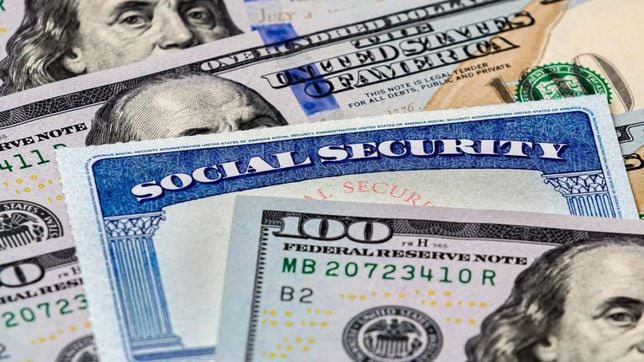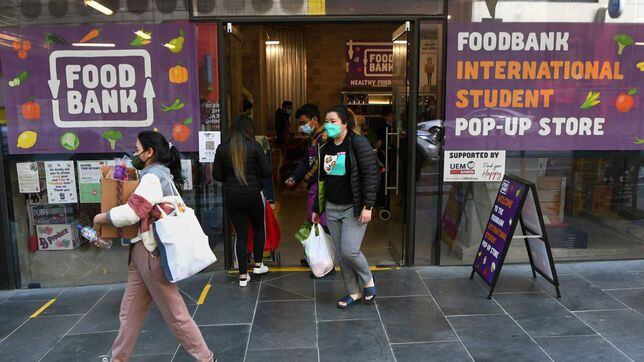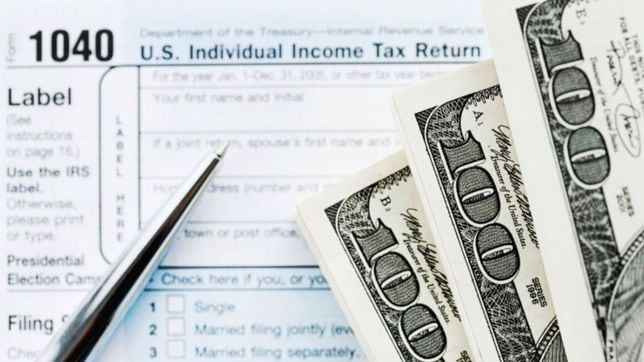US financial news summary | 9 June 2023
CPI and inflation report for release next week, SNAP work requirements, double Social Security payments in June, job market. Follow the latest news here.


Show key events only
US Finance news, Friday, June 9, 2023
Headlines | Friday, 9 June 2023
- Initial unemployment claims rose by 28,000 to 262,1000 last week
- Federal Reserve officials meet to discuss further changes to monetary policy, including the possibility of another rate hike in June
- Housing market cools in a fifth of US' largest metro areas
- The strength of the US dollar, explained
- Food shortages could lead to increases in prices once again later this year
- The rules regarding using your 401(k) to purchase your home
- Consumer Price Index to be released on 13 June
Social Security sends payments to recipients on a specific schedule each month. The exact payment dates vary based on the beneficiary’s birth date, unless you were born before May 1997
Beneficiaries born between the 11th and 20th day can expect to receive their Social Security payments on the third Wednesday of every month. The next payment date will be 15 June, 2023.
Prospects of early reitrement are not great
According to the SSA, the maximum Social Security benefit for someone who retires at full retirement age is $3,627 per month. However, if you retire in 2023 at age 62 your maximum benefit would be $2,572. On the other hand, waiting until age 70 to claim increases the maximum benefit to more than $4,555.
And with Gen Z having very little savings, the penalties for retiring early are looking pretty damaging.
If someone chooses to retire at 62, they can still receive Social Security benefits but the benefits will be reduced. The reduction is based on the number of months they claim benefits before reaching their full retirement age. The maximum reduction for individuals retiring at 62 is typically around 30 percent of their full retirement benefit.
As the United States came out of the pandemic, people went on a purchasing frenzy as they revenge shopped. However, all that pent-up demand collided with a lack of available goods due to supply chain disruptions caused by covid-19. That sent prices soaring last year with inflation peaking at 9.1%, a rate not seen since the early 1980s.
Fortunately, price increases have since receded but are still more than double the US central bank’s target of 2%. This is partly due to the unclogging of supply bottlenecks and also the Federal Reserve ratcheting up of interest rates. The overnight bank funding rate has gone from near zero to the range of 5.00% to 5.25% since March 2022 after ten consecutive increases.
One of the data points the Fed is likely to take into consideration as it adjusts its monetary policy is the June Consumer Price Index report, which will be released next week... read our full coverage for more details.
In 2021, a record sixty-eight percent of workers were offered a retirement plan as a benefit of employment.
In addition to pensions provided by employers, such as those available to public sector employees, there are various private accounts with their unique structures. A popular choice is the 401(k), which enables individuals to save money for their retirement without being taxed until they withdraw the funds many years later. Furthermore, the portion of one’s income allocated to a 401(k) can be deducted from their taxable income, potentially resulting in a lower tax rate.
Read our full coverage for details on how much the average worker has saved at each age and for information on how much financial experts advise workers to save throughout their careers.
After home prices began coming down in 2022, they are again ticking up, even as the interest rates for 15-and-30-year mortgages hit their highest levels over a decade.
The Federal Housing Finance Agency (FHFA) publishes quarterly data that tracks changes in the prices of homes in the country’s 100 largest metropolitan areas. Of all areas, only a fifth have seen prices fall over the last year. The challenge for first-time homebuyers will be that many of the cities that have seen prices decrease are very expensive housing markets, to begin with.
Read our full coverage for details on which metro areas have seen the sharpest decrease in housing prices.
Inflationary pressure is easing out of the economy and job growth is exceeding expectations. In light of these factors, investor behavior suggests a more optimistic economic outlook.
The stock market is said to be inching closer to “bull” territory, as evidenced by a 20% increase in the S&P 500 since October.
What does this mean, and how does it differ from a bear market?
The Fiscal Responsibility Act was signed into law after much negotiation between Congress and the White House. SNAP work requirements were a main issue.
Prior to the debt ceiling deal, work requirements were already in place to avail of SNAP benefits. The new law has expanded these requirements to include new age groups.
Stock market volatility drops to record low ahead of eventful week
Stocks closed higher on Thursday regaining some of their momentum thanks to a rebound by technology stocks, while volatility dropped to record lows ahead of an eventful economic and policy calendar next week.
The CBOE Volatility index, also known as Wall Street's fear gauge, dropped to a fresh post-pandemic record low.
"What you are really seeing in the vol market is an unwillingness to engage," said David Bianco, Americas chief investment officer for asset manager DWS Group. "You've just got paralysis in investors."
Investors were sitting on the sidelines ahead of inflation data and a Federal Reserve policy meeting next week.
Can shopping around for gas save you money?
Being smart about filling up your tank can save you hundreds of dollars over the course of the year. Prices can vary widely from one gas station to the next but also depending on which day you head to the pump can make a difference too.
The US has various economic aid programs with the aim of offering assistance to low-income people. One of the best known is the Supplemental Nutrition Assistance Program, also known as SNAP.
In addition to SNAP coupons, there is assistance that is quite similar but not as well known. This is the WIC Program: for Women, Infants & Children only.
Initial unemployment claims surged by nearly 30,000 last week
Last week, initial unemployment claims (i.e., the number of workers claiming unemployment insurance for the first time) rose by 28,000 to 261,000. This is the highest level recorded since late October 2021.
The Bureau of Labor Statistics reported that in May, the unemployment rate increased to 3.7 percent, and if these initial claims trends continue, more workers could be stripped from the labor market this month.
Zooming out we also see that at the end of May, the total number of unemployed workers claiming benefits fell by over 20,000 to 1,757,000.
In April, the IRS announced that nearly 1.5 million people nationwide were still eligible to receive a tax refund worth up to $900.
It may not just be a $900 refund either, as many low- and moderate-income taxpayers might also be eligible for the Earned Income Tax Credit. For tax year 2019, the credit was $6,557.
Each month, the Social Security Administration sends money to millions of people in the United States.
This includes retired workers, recipients of Supplemental Security Income, as well as remitting disability and survivor benefits. It’s now time to send payments of more than $1,800 for the month of June.
Payments are calculated on an individual basis based on the “Primary Insurance Amount”. The amount of benefits may be affected by the age of the beneficiaries, as well as the increase in the cost of living adjustment.
Wealth not generated through labor contributes greatly to inequality
The St. Louis Fed has released a new blog highlighting the ways wealth that is not generated through labor contributes to economic inequality.
Researchers said that for the vast majority of workers (up to 90%), using their "human capital" (i.e., their education, skills, muscles, etc,) is how they are able to accumulate wealth.
However, for the top ten percent of wealthiest households, only 29 percent comes from their labor. The other sources include the increase in value for financial assets like stocks. Stocks in companies where the other ninety percent of households work, and that through that work, those who own stock are able to see the benefits.
The Supplemental Nutrition Assistance Program is a crucial federal assistance program in the United States that aims to provide food support to individuals and families with limited financial resources. Formerly known as the Food Stamp Program, SNAP plays a significant role in combating hunger and improving nutrition for vulnerable populations.
Eligibility for SNAP benefits is primarily based on income and household size. Generally, households with gross incomes at or below 130% of the federal poverty level qualify for assistance.
Social Security benefits are most often associated with payments to retired workers. While those make up the vast majority of the tens of millions the Social Security Administration issues each month, retirees aren’t the only ones. The disabled and survivors also receive income from the agency as well as low-income individuals that qualify for Supplemental Security Income.
Certain people in the latter group of recipients will see an increase in their monthly checks starting this month. This is thanks to the complementary payment plan approved in 33 states across the nation.
Changes coming to SNAP benefits with the debt ceiling bill
The bipartisan deal, called the Fiscal Responsibility Act, would expand requirements for SNAP, which was formerly known as food stamps. As the program currently stands, there are already work requirements in place for most able-bodied adults without children from the ages of 18 to 49.
These recipients must either be earning wages equivalent to 30 hours per week, looking for a job, or signed up for a SNAP employment training program for at least 80 hours a month.
Finance and economic news: Welcome!
The bipartisan debt ceiling bill signed into law by President Joe Biden averted a historic and potentially catastrophic debt default. However, the measure's provision for new SNAP work requirements will affect many beneficiaries of the Supplemental Nutrition Assistance Program.
Meanwhile, the May jobs report blew past expectations yet again. Despite the robust hirings data, investors are betting that the Fed will hold off hiking interest rates when they meet on 13-14 June. Also, the unemployment rate went up last month despite the new hirings.
Aside from the Federal Reserve's action on interest rates, the Consumer Price Index and inflation report will also be released next week.




/cloudfront-eu-central-1.images.arcpublishing.com/diarioas/X5OVLK4K3BNPTJSXJW7STUTW7Q.jpg)


/cloudfront-eu-central-1.images.arcpublishing.com/diarioas/FQXZHYDDINEHLMHSFUR3V4AH6Q.jpg)





